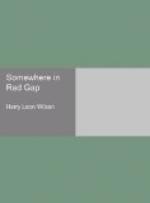“Any time they back Little Sure Shot up against the wall they want to duck,” said he warmly. “He has ’em hard to find in about a minute. Tell him about that fresh depity marshal, Jimmie.”
“I already did,” said Jimmie.
“Ain’t he the hell-cat?” demanded Boogles, mopping a brow that Daniel Webster would have observed with instant and perhaps envious respect.
“I been a holy terror in my time, all right, all right!” admitted the hero. “Never think it to look at me though. One o’ the deceivin’ kind till I’m put upon; then—good-night!”
“Jest like that!” murmured Boogles.
“Buryin’ ground—that’s all.” The lips of the bad man shut grimly on this.
“Say,” demanded Boogles, “on the level, ain’t he the real Peruvian doughnuts? Don’t he jest make ’em all hunt their—” The tribute was unfinished.
“You ol’ Jim! You ol’ Jim Time!” Shrilly this came from Lew Wee, Chinese cook of the Arrowhead framed in the kitchen doorway of the ranch house. He brandished a scornful and commanding dish towel at the bad man, who instantly and almost cravenly cowered under the distant assault. The garment of his old bad past fell from him, leaving him as one exposed in the market-place to the scornful towels of Chinamen. “You run, ol’ Jim Time! How you think catch ‘um din’ not have wood?”
“Now I was jest goin’ to,” mumbled Jimmie Time; and he amazingly slunk from the scene of his late triumphs toward the open front of a woodhouse.
His insulter turned back to the kitchen with a final affronting flourish of the towel. The whisper of Boogles came hoarsely to me: “Some of these days Little Sure Shot’ll put a dose o’ cold lead through that Chink’s heart.”
“Is he really dangerous?” I demanded.
“Dangerous!” Boogles choked warmly on this. “Let me tell you, that old boy is the real Peruvian doughnuts, and no mistake! Some day there won’t be so many Chinks round this dump. No, sir-ee! That little cutthroat’ll have another notch in his gun.”
The situation did indeed seem to brim with the cheerfullest promise; yet something told me that Little Sure Shot was too good, too perfect. Something warned me that he suffered delusions of grandeur—that he fell, in fact, somewhat short of being the real doughnuts, either of a Peruvian or any other valued sort.
Nor had many hours passed ere it befell emphatically even so. There had been the evening meal, followed by an hour or so of the always pleasing and often instructive talk of my hostess, Mrs. Lysander John Pettengill, who has largely known life for sixty years and found it entertaining and good. And we had parted at an early nine, both tired from the work and the play that had respectively engaged us the day long.




